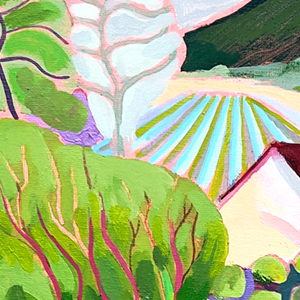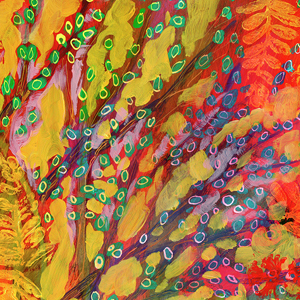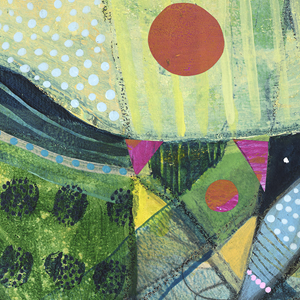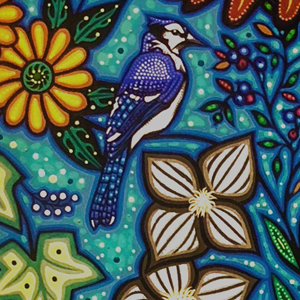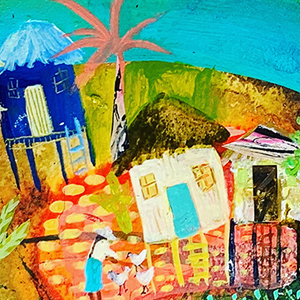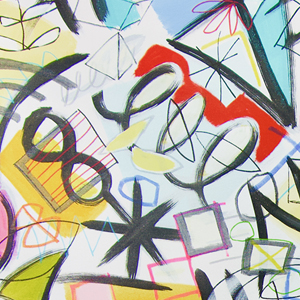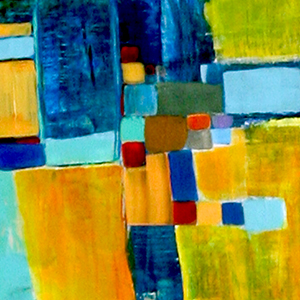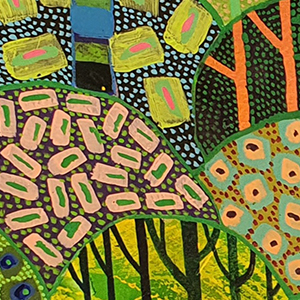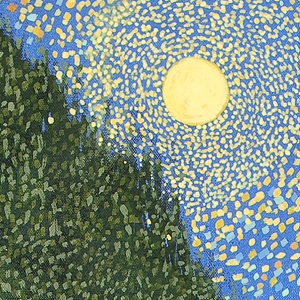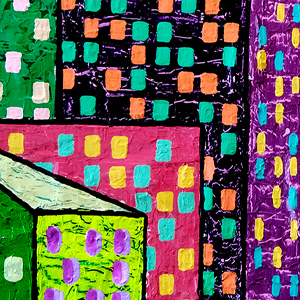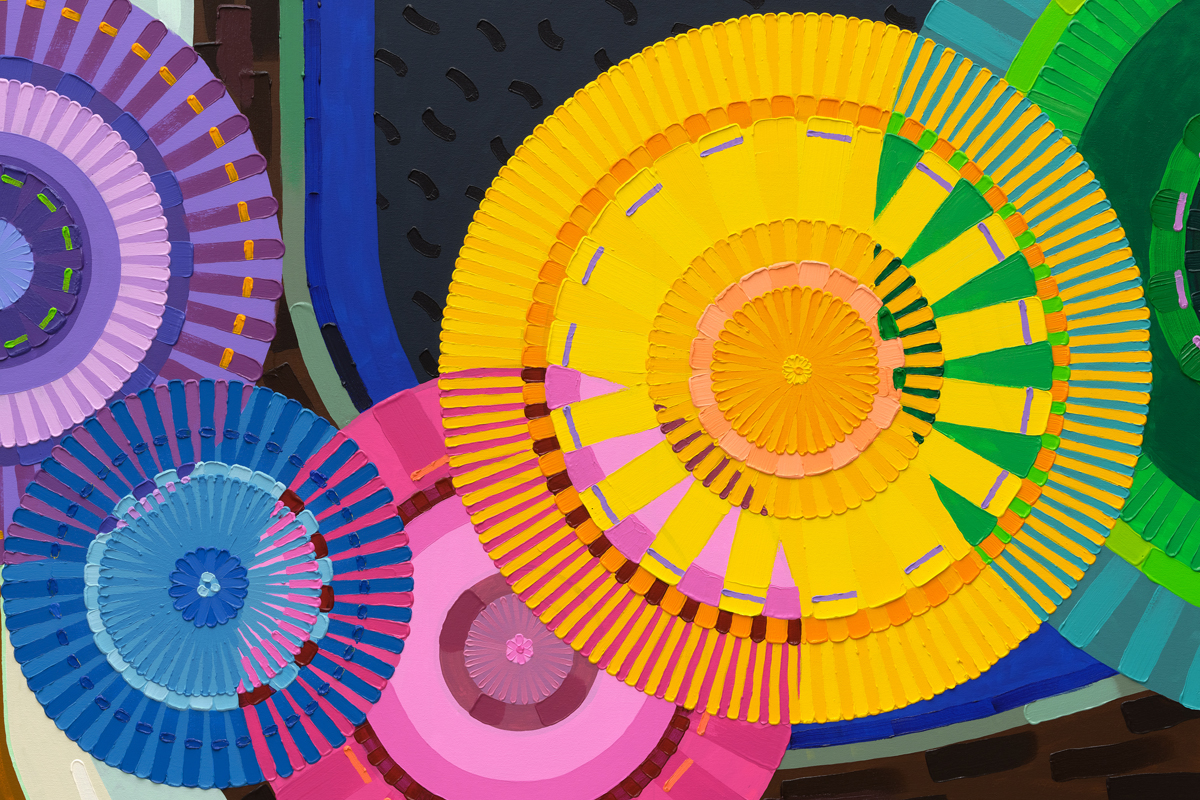
Good Engineering
Experience and Extend
Joshua Brake
Artwork: “Monarch Over Indigo” by June Edmonds © 2022
When I arrived in Longview, Texas to attend LeTourneau University in the fall of 2010, I had only the faintest notions of what I wanted to do with my life. As a kid, I loved to work with my hands and build things. Coupled with a budding love for math and science, I began a journey to explore engineering.
I still remember that first semester. The Advanced Placement courses I had taken in high school enabled me to jump right into the gateway course for the electrical engineering concentration: Electric Circuits I. Circuits I was no picnic, in large part due to the man who had developed and taught the class for the last forty years, Dr. Bill Graff. Bill somehow held together the personas of the quintessential grandpa and the professor with ruthlessly high expectations for his students. Bill famously had a t-shirt with “I fight grade inflation!” emblazoned on the front.
Circuits felt like drinking from a firehose. We quickly learned that the “pop quizzes” on the first few days of class would stop surprising us. It was more shocking to not come into class to meet a quiz in the first few minutes. As I labored through Circuits that semester, I developed a love for the course. Solving the problems was fun, and I loved the way that the theory was reinforced with the hands-on lab exercises we would do each week, building and testing circuits on breadboards.
What I didn’t realize at the time was that Electric Circuits would be the start not only of my craft as an engineer, but as an educator as well. At the end of the semester, one of my friends recommended me as a Supplemental Instructor (SI) for the course the next semester. SIs helped support students in the class by offering recitations and study sessions a few times a week, reinforcing topics from lecture and offering space for students to ask questions in a more relaxed environment.
But the best part of being an SI for circuits was getting to apprentice with Dr. Graff. After a few semesters as the SI for circuits, I began to recognize some common problems faced by students when moving from theory to practice. In response, I compiled a small booklet of problem-solving approaches to help students develop a more intuitive approach to the problems they encountered. I showed it to Bill and he loved it, offering to connect me with his contacts at McGraw-Hill to explore potential routes to have it published. Bill saw something in me. He took the time to see me and consider how he might help encourage me to continue pursuing an area where he saw potential. He shared his network with me, enabling me to self-publish my little booklet through McGraw-Hill and add an ISBN-coded book to my resume.
As much as I learned from Bill in class, the most significant ways I benefited from knowing Bill were relational and not academic. His example and influence taught me what it looks like to develop the lasting impact that I desired for my own career. And his generosity was a key part.
• • • • • • • • • • • • • • • • • • • •
My experiences with Bill convinced me that we often lose sight of the power of simple, consistent acts of generosity. I am willing to bet that if you ask anyone about their most meaningful educational experience, they will almost invariably respond not with a particular skill they learned, place they went, or project they worked on, but with a relationship. Most of the time, that relationship was formational because a teacher, coach, mentor, or family member gave them their time and attention. Even more importantly, that person likely gave them something they didn’t deserve, seeing something in them and going above and beyond to pour into them.
Generosity is at the heart of those formational experiences. As I reflect on the person I want to be, I can’t help but see the influence of the generosity of others on the shape of my development as a person. Almost every significant inflection point in my life has been downstream of generous relationships: parents who provided for my physical and emotional needs as a child, teachers who helped cultivate in me a love for learning, professors who gave me their time and attention as I continued to hone my craft, and mentors who shared their networks with me.
The deep impact of the generosity that I’ve experienced created the desire to extend that same generosity to others. I certainly want to help my students build the skills and character that will help them to access fulfilling vocations. But I also want them to understand that a fulfilling career is not something you can earn or deserve. Rather, it is something that you hold with an open hand, even as you strive to pursue excellence to the best of your ability.
Unfortunately, the orientation of much of our culture is built on the often-unstated assumption that relationships are fundamentally transactional. We are always running cost-benefit analyses in our heads and trying to figure out if the return on what we give will be worth it. This transactional view of the world reinforces the idea that our accomplishments have been earned by our own efforts. This blinds us to the many ways in which our achievements have been significantly influenced by the generosity of others who have extended their own resources on our behalf.
Hard work matters. And yet, if we want to maximize our impact on the world, we need to focus beyond what we do. In a world increasingly focused on transactional relationships where we are seeking our own good, we desperately need a renewed vision of the ways we have been the recipients of the generosity of others. Then, in response to the generosity we have experienced, we can see our own resources as a gift that is not for ourselves, but rather as one to be shared generously with the people around us.
• • • • • • • • • • • • • • • • • • • •
As I continued my studies at LeTourneau and began to consider graduate school, I was at yet another juncture in my career trajectory. Generosity once again played a pivotal role. I had excelled at LeTourneau, but getting into a top-tier graduate school is never a slam dunk, especially when you’re coming from a place that people might mistake for a French cooking school.
I sent in all my grad school applications and the waiting process began. After submitting them, I reached out to some potential future advisors. After a promising phone interview, I noticed that this same professor had a talk at the optics conference in San Francisco where I was presenting my undergraduate research. I emailed to ask whether I could grab coffee with him. He emailed me back and volunteered to do one better, offering to fly me down to Caltech for a day to visit with his group. I was ecstatic.
It rained the day I visited Caltech, ironically enough, for what felt like the last time during my five-year tenure there. Despite the rain, I had a great day, getting to experience firsthand the place that would be my academic home for the next five years. I got to meet the professor who would be my PhD advisor and spend time with the members of his research group, many of whom would be formative pieces of my graduate school experience. All of this was enabled by an act of generosity; time and attention out of a busy schedule to give a kid from a small college in East Texas that he had never heard of a chance.
• • • • • • • • • • • • • • • • • • • •
These experiences of generosity shape the influence I want to have on my students. Recognizing the role that generosity has played in my life breaks down any misconceptions about my accomplishments as the direct product of my own merit. Generosity requires that we loosen our grip on a meritocratic view of our world—the idea that the places we’ve gotten in our lives and careers are the result of our own efforts alone. Our lives are deeply shaped by the opportunities and resources that others have provided to us. And yet, we so easily forget this.
Recognizing the generosity of others also has another effect. It encourages us to consider how we might extend generosity to others. Extending generosity doesn’t happen by accident. The ability to see and respond to opportunities for generosity requires intentional preparation.
One of my favorite examples of this concept in practice is in the story of the famous New York City restaurant, Eleven Madison Park. The story, told in restaurateur Will Guidara’s book Unreasonable Hospitality, follows Guidara’s quest to create the world’s greatest restaurant. The core of his thesis is that exceptional food is not enough. What matters most is the experience. The feats that Will and his staff pulled off are unbelievable—from creating a fake beach experience in the restaurant for guests who had their trip to the oceanside scuttled to buying sleds for a family from Spain experiencing their first snow while they were visiting the city. Will’s obsession with curating the customer experience at Eleven Madison Park was the fuel that propelled it to the top of the restaurant world. At its root, Eleven Madison Park’s success was built on a culture of generosity. While these experiences require financial resources, the money was not what made them happen. Instead, the impact of these experiences was birthed out of generosity—starting with the gift of the attention necessary to see another person and followed by the material resources to create something magical.
As I think about extending generosity to those I interact with, I’ve learned a few things from my own experiences and from the stories of others like Will Guidara. The first thing is that generosity is downstream of intentional preparation. While generous actions may be spontaneous, they require forethought and resources. These resources take time to build, and require that we intentionally create margin in our days so that we can exercise generosity when the moment presents itself.
In my life, I want to maintain a margin in order to create opportunities for generosity. Whether that is time on my calendar or dollars in my bank account, I want to intentionally earmark resources for me to give generously. Without specifically allocating these resources as supplies for generosity, they will naturally be devoted elsewhere.
The second reflection is that authentic generosity requires attention. As we interact with the people around us, we can only demonstrate generosity if we are paying attention—hearing and seeing them and specifically looking for opportunities to be generous. The most generous gifts are given without being requested. To be generous with our resources, we need to be looking to see how they might best be given to those around us.
• • • • • • • • • • • • • • • • • • • •
Unfortunately, cultivating margin and attention is swimming upstream against the currents of our culture. In a world where we’ve built our technology to monetize and capture as much of our time, money, and attention as possible, building the capacity to unlock our potential for generosity is increasingly difficult. With the continuing march of technologies like generative artificial intelligence, we are likely to continue to move toward increasingly transactional relationships.
The good news is that there are more opportunities than ever for generous action to have an influence. My goal, and I hope yours, is to use my experiences of generosity as a catalyst to help me extend that generosity to others. Experiencing and extending generosity, more than almost anything else that I teach my students in the classroom, is what I believe will lead them to a life of flourishing.
 Joshua Brake is an assistant professor of engineering at Harvey Mudd College. Before joining the faculty at Harvey Mudd, he completed a PhD and MS in Electrical Engineering at the California Institute of Technology and an MS and BS in Engineering with an Electrical Concentration at LeTourneau University. In addition to his teaching, he directs the Harvey Mudd College Biophotonics Lab where he and a group of undergraduate researchers are developing new optical tools for plant biology and neuroscience. More of Josh’s thoughts on technology, education, and human flourishing can be found in his weekly Substack newsletter, The Absent-Minded Professor (joshbrake.substack.com).
Joshua Brake is an assistant professor of engineering at Harvey Mudd College. Before joining the faculty at Harvey Mudd, he completed a PhD and MS in Electrical Engineering at the California Institute of Technology and an MS and BS in Engineering with an Electrical Concentration at LeTourneau University. In addition to his teaching, he directs the Harvey Mudd College Biophotonics Lab where he and a group of undergraduate researchers are developing new optical tools for plant biology and neuroscience. More of Josh’s thoughts on technology, education, and human flourishing can be found in his weekly Substack newsletter, The Absent-Minded Professor (joshbrake.substack.com).
Fall 2024
Part I: Abundant Virtue
Laurie L. Patton
Sarah A. Schnitker
Patricia Snell Herzog
Melissa Fitzpatrick
Dirk Philipsen
Interlude: Generous Eyes, Radical Love
Fr. Martin Lam Nguyen, CSC
Part II: Abundant Vocation
MORE





